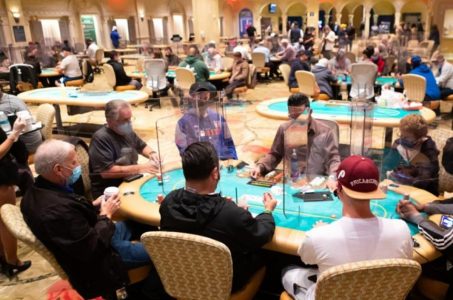Weekends Starting to Ramp-Up in Las Vegas Casinos, Weekdays Remain Quiet, Hard Rock Chairman Reports
Posted on: September 2, 2020, 07:30h.
Last updated on: September 3, 2020, 01:44h.
A casino industry leader says Las Vegas gaming business is picking back up on weekends. Weekdays, however, continue to be “very soft,” according to Hard Rock International Chairman Jim Allen.

Meeting the Future
In his report, Hard Rock International Chairman Jim Allen says the fallout from COVID-19 will be ongoing for the future of the gaming epicenter, and it won’t only affect gambling, but ancillary business like meetings and conventions as well.
… [meeting and convention events] are now being done online, I definitely think that business model is changing, and to have two, three, 400,000 square feet of meeting space, that may be something that needs to be revisited in the future,” Allen said.
Major events like the Global Gaming Expo (G2E) that brings major revenue into the city each year are going online for 2020 at least, and the impact will be palpable.
Industry Experts Agree There’s a Long Road Ahead
When asked for comment on Jim Allen’s predictions, the Boston College finance professor Rev. Richard McGowan, who closely follows gambling trends, told Casino.org the observation “is a quite realistic statement about the future of Las Vegas.”
McGowan noted that Allen’s comments about “convention space is quite telling. Many businesses realize that they can have meetings via Zoom or [Microsoft] Teams instead of traveling. The question becomes, ‘What would a casino do with the extra space if they cut the convention space?’”
McGowan floats such options as “perhaps expanded sports betting? Esports? Maybe other types of gaming? How a casino downsizes is an interesting problem once you have built the space.”
The CBER Southern Nevada coincident index “shows a V-shaped recovery, having recovered in May and June 2020 64 percent of its December 2019 to April 2020 decline,” said Stephen Miller, a UNLV economics professor and director of the university’s Center for Business and Economic Research (CBER), told Casino.org.
In a V-shaped recession, an economy quickly rebounds after a steep decline. Economists generally believe this kind of recovery is the best-case scenario for America.
Miller explains the CBER index includes “taxable sales, gross gaming revenue, and nonfarm employment,” Miller explained.
Revisiting Vegas
In May, Hard Rock International began exploring casino opportunities in Las Vegas. That’s after it purchased rights to the Hard Rock brand and related trademarks in Las Vegas from Houston-based private equity firm Juniper Capital, which had purchased Hard Rock Hotel & Casino Las Vegas in 2018.
The former Hard Rock Las Vegas is getting rebranded into a Virgin Hotel, and JC Hospitality, which owns the property, plans to announce an opening date in September, reported KSNV, a local TV station.
Under the May deal, Hard Rock and affiliates are no longer restricted from developing, owning, licensing, managing, or operating any Hard Rock-branded casino and integrated resort within Clark County.
During the Fox interview, Allen also pointed out Hard Rock operations in Florida are “exceeding last year’s numbers,” but added that $2.2 billion was spent “in the expansion for the Tampa property and the guitar-shaped hotel … in South Florida.”
Allen additionally pointed out that “business in Florida in both July and August was extremely strong,” and “our business in Ohio is OK.” In Atlantic City, business is “slowly coming back,” Allen added.
So from a return on investment, we’re not where we thought we would be. But certainly year over year numbers are up,” Allen said.
“There’s no doubt that what has occurred in the regional markets, whereby state law many facilities are operating with 50 percent capacity, but (are) frankly doing the same, or in some cases, more revenue on an individual per-unit basis.”
Related News Articles
Hard Rock International Wins Right to Build Ottawa Casino
VICI Properties Slides on News of Secondary Offering Worth up to $927.36M
MGM Japan Casino Spend Could Be $2.5B, Says S&P
Most Popular
NBA Referees Expose Sports Betting Abuse Following Steve Kerr Meltdown
Robinhood CEO Says Broker is Examining Sports Betting
Caesars Virginia in Danville Delays $750M Casino Resort Opening
Former Resorts World & MGM Grand Prez Surrenders Gaming License
Most Commented
-
Caesars Virginia in Danville Now Accepting Hotel Room Reservations
— November 27, 2024 — 8 Comments -
NBA Referees Expose Sports Betting Abuse Following Steve Kerr Meltdown
— December 13, 2024 — 5 Comments -
VEGAS MYTHS RE-BUSTED: Casinos Pump in Extra Oxygen
— November 15, 2024 — 5 Comments -
Former Resorts World & MGM Grand Prez Surrenders Gaming License
— December 15, 2024 — 4 Comments
















No comments yet